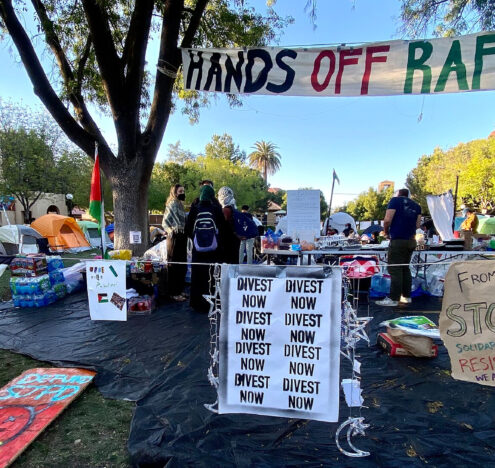Imagine that China, Russia, or Venezuela took up the lost cause of Donald Trump’s 2020 re-election. That Trump was received by a litany of senior officials in Beijing who expressed support for the democratic aspirations of the American people and pledged to host a “comprehensive strategic dialogue” with “Make America Great Again” or MAGA-supportive journalists and activists. Additionally, imagine that the state hosting Trump was hundreds of times more powerful than the United States, capable of forcibly overthrowing the government in Washington.
This is precisely what has happened in the case of Belarussian opposition leader Sviatlana Tsikhanouskaya. Though Tsikhanouskaya is legitimately the victim of an unjust electoral process and forcibly repressive government (unlike Trump), such distinctions matter little in the paranoid view of the Alexander Lukashenko regime.
Today, what progress can such efforts claim to have yielded? Instead of appearing afraid of US policy, Belarus has only ratcheted up its repressive apparatus and taken the drastic step of hosting Russian nuclear weapons on its soil, while democrats in Minsk (or in exile) appear no closer to power.
Elevating the profile and status of opposition leaders and activists who have no viable path to power creates serious damage for bilateral relations with US adversaries. Empty rhetorical support often produces the worst of both worlds, and it forecloses the possibility of any transactional diplomatic progress with an adversarial state while failing to create a realistic means of displacing its government.
Elevating the profile and status of opposition leaders and activists who have no viable path to power creates serious damage for bilateral relations with US adversaries.
Even full-fledged efforts at forced regime change, while tremendously dangerous and justifiable only in exceedingly rare cases, can claim to promise some return on investment. In contrast, the current mode of officially promoting long-shot opposition figures with no promise of paving their path to power brings no tangible gains for US interests. Instead, this approach often fuels the worst instincts of repressive regimes, both at home and abroad, and opens the United States to criticism about its own democratic backsliding.
The recent fiasco of recognizing Juan Guaido as the interim president of Venezuela is another illustrative case. There was never a viable path for Guaido to displace Nicolás Maduro and take power, short of a full-scale US intervention for which the disastrous consequences were agreed to be unacceptable.
Once Guaido’s movement lost its mandate through a (deeply flawed) electoral process, continued US recognition of his leadership created headaches for transatlantic and regional relations. The European Union and Lima Group states quickly moved toward non-recognition of Guaido, whereas Washington only pulled the plug in 2023 after the Venezuelan opposition voted him out as its leader, citing a failure to deliver on his democratic promises and a loss of popular support. Again, results from recognizing Guaido are scant, and Venezuela’s humanitarian crisis has only continued to worsen since his initial rise.
A recent Iranian opposition movement based in Georgetown further highlights the contentious and fraught nature of engaging opposition movements. The coalition included a wide swathe of perspectives on Iranian politics, including the son of exiled Shah Reza Pahlavi. But it soon collapsed under the weight of its internal contradictions before its fledgling efforts to gain official status in the United States and Europe could take off. Had the West gone any further in engaging this coalition, it would have proved a serious embarrassment and brought zero relief to Iranians.
Casting doubt on this policy approach does not equate to support for Lukashenko, Maduro, or any other authoritarian strongman. This is also not a dismissal of citizens who seek a just and representative government. Rather, it is a call to carefully examine how and when Washington can, cannot, should, or should not support these movements.
There is incredible complexity in the constitutions of opposition movements around the world, and tremendous legal nuance in the recognition of their “legitimacy.” Advocates of US support and recognition of these movements should provide, on a case-by-case basis, a credible theory of the case that elaborates how official recognition will tangibly advance US interests, why US support is likely to bolster democratic progress rather than backfire, and how the adversarial government is likely to respond via escalation. The idea that adversarial governments will crumble under such pressure — a myth proved wrong in countless cases — does not suffice as evidence.
This call does not center on criticism of the Biden administration, which appears to have engaged somewhat cautiously with opposition movements. It has not taken up the currently fringe position that Tsikhanouskaya is the legitimate leader of Belarus. When asked about its position on the Iranian diaspora, the Department of State stressed that the US government cannot credibly speak for the people of Iran, and only met with activist Masih Alinejad after the emergence of credible plots to attack her on US soil. It should continue to exercise this caution and beware of the lofty promises of would-be leaders in exile.





















